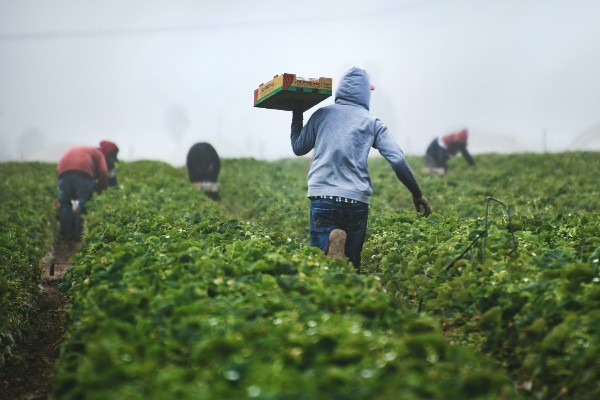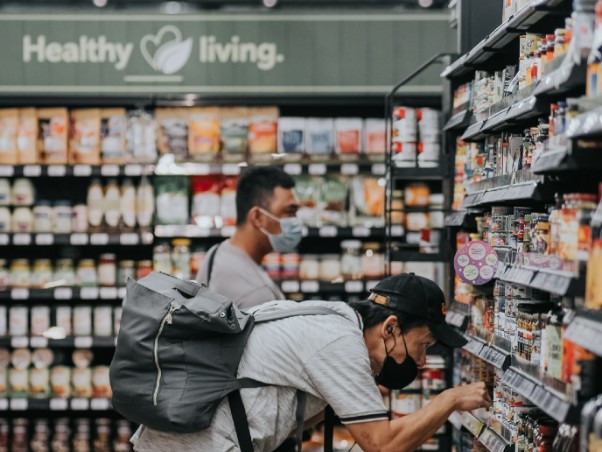June 14, 2022
The new, first of its kind strategy follows Henry Dimbleby's 2018 independent review of the UK food system and outlines the government's plans on health, sustainability, food waste, animal welfare and labelling.
In response to Covid-related supply chain pressures, post-Brexit strain on the UK’s labour market, and supply chain issues caused by the war in Ukraine, the strategy focuses heavily on boosting the UK’s domestic resilience. With increasing concern surrounding the impact of rising food prices on the cost-of-living crisis, it also seeks to mitigate against some of these impacts.
The full strategy is available to download from the gov.uk website. We have also summarised our key takeaways from each of the core areas it covers below.
The objectives
As outlined by DEFRA, the objectives for the strategy are to deliver:

- a prosperous agri-food and seafood sector that ensures a secure food supply in an unpredictable world and contributes to the government’s levelling up agenda by providing quality jobs for UK workers across the country
- a sustainable, nature positive and affordable food system that provides both choice and access to high quality products that support healthier and home-grown diets for all
- trade that provides export opportunities and consumer choice through imports, without compromising regulatory standards for food, whether produced domestically or imported
However, while the strategy covers many of the key issues addressed in Dimbleby’s 2018 review, there are several recommendations that have not been taken forward.
The most notable omission is the proposed High Fat, Sugar and Salt (HFSS) reformulation tax which would have placed additional levies on unhealthy foods. As with the governments planned restrictions on volume promotions for HFSS products (such as by-one, get-one-free), the proposed tax has been shelved by the government in direct response to the increased cost this would place on consumers.

Food security
In response to the supply chain issues caused by Russia’s invasion of Ukraine and the Covid-19 pandemic, one of the main objectives of the strategy is to build resilience across the UK’s food supply chain.
To address this, it sets out plans to bolster domestic resilience and covers recent issues such as fertilizer supply.
The government have also pledged to ensure that Britain retains its place in global markets to “keep trade flowing and keep food prices down”, and “increase global food security in the long term through increasing the sustainability and resilience of agriculture and other areas of the food system.”
To ensure resilience is maintained, the government will monitor the nation's food supply through a UK Food Security Report that will be published every three years.
Sustainable production
With emissions from machinery and livestock contributing to heavily to climate change, the strategy also sets out measures to reduce the carbon footprint of UK food production.

While it builds on the government’s existing Net Zero strategy for tackling emissions, it doesn’t contain any significant new commitments on agricultural emissions but does highlight steps for improving land use.
Dimbleby’s 2018 review recommended significant changes to the UK’s current approach in order to increase biodiversity and isolate carbon while maintaining food supply. Based on these recommendations, DEFRA will publish a land use framework in 2023 and has committed to spending £270 million on sustainable farming innovation programmes by 2029.
To reduce the emissions resulting from meat production, the strategy has also sets out an approach for increasing the production and consumption of alternative proteins.
As part of their partnership with UK Research and Innovation, the non-departmental public body that directs research and innovation funding, the government will build on their £130 million investment in research with a “Call for Evidence” to better understand the challenges associated with the use of materials that can reduce methane emissions from livestock.

Labour supply
Labour supply is another serious issue currently facing UK food production.
Noting that a shortage of seasonal workers is already having a significant impact, DEFRA has announced it will extend aspects of the Seasonal Worker visa route and, moving forwards, the government will work with industry to identify shortages and inform the Migration Advisory Committee’s (MAC) upcoming review.
Recognising that the food sector cannot sustainably rely on migrant labour alone, the government will also commission an independent review to tackle labour shortages across the food supply chain.
This will consider the roles of automation, domestic labour, and migration to ensure UK businesses can access the labour they require.
Supporting healthier choices
With cost-of-living crisis showing no signs of abating, the strategy aims to promote healthier choices rather than increasing taxation. DEFRA say government should encourage innovation and “incentivise industry to reformulate and promote healthier food that is more accessible” by designing policy that drives improvements across the food environment.

A key commitment outlined in the strategy is the introduction of a Department of Health-led "Health Disparities White Paper" which will set out “further measures to tackle health disparities and boost well-being in every part of the UK.”
The Government has also made a commitment to further research on obesity and the impact of ultra-processed foods through the Diet & Health Open Innovation Research Club.
This £11m initiative led by UK Research and Innovation will support research and drive improvements in understanding the relationship between food and health.
The strategy also commits to launching a programme of pilots to test anti-obesity interventions and improve the evidence base for healthier diets.
Informed consumers
In order to help consumers make more informed, sustainable and healthier choices, the government will ensure that the food information provided on labels, online and through QR codes is optimised and based upon a set of established overarching principles.
Stating that better-informed consumers can drive positive change from producers, the government has set out plans to introduce a new Food Data Transparency Partnership. This partnership will bring together representatives from across government, the supply chain and civil society who will collaborate to develop consistent metrics for better understanding the impact of food production.

The partnership will collect data that measures health, environmental, sustainability, and animal welfare to inform future policies and allow government to regularly report on progress.
DEFRA will also introduce a mandatory methodology for eco labels, standardising metrics for the sustainability of products and reducing the capability for “greenwashing” in the food sector.
They have also consulted on labelling for animal welfare and plan to expand current mandatory requirements, citing the poultry sector as a best-practice example where there is already an agreed set of welfare standards that food labelling could build on.
GS1 UK welcomes the introduction of the Food Data Transparency Partnership. We believe this will be one of the most impactful areas as increasing collaboration between government and industry on the collection of accurate and consistent data will be a key factor in powering progress across the food system. This will not only enable government and industry adapt to change, plan for the future and implement new initiatives for producing healthier, more ethical and sustainable food, but will also play a key role in providing consumers with the clarity they need to make more informed food choices.
GS1 UK believes the Food Data Transparency Partnership outlined in the government’s National Food Strategy will provide the framework required to address the major issues such as supply chain resilience, health, food waste and sustainability. The government however needs to ensure the Partnership is set up for success and this can only be achieved by a UK wide approach and collaboration. Only then will the data be of the right quality to address the demands of consumers and industry alike.”
Anne Godfrey
GS1 UK CEO
DEFRA has announced it will begin the implementation of mandatory reporting on health - and possibly sustainability and animal welfare - by the end of 2023. Large companies will be required to report on food sales and waste, with reporting requirements initially targeted at large companies across retail, manufacturing, out-of-home, food-to-go and online delivery businesses.

Keeping consumers informed and protected
Discover how we are collaborating with industry to develop solutions that work for all.

Building a sustainable business
How can emerging mission-driven brands minimise their environmental impact?

